| Srl | Item |
| 1 |
ID:
157271
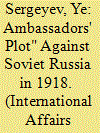

|
|
|
|
|
| Summary/Abstract |
The several weeks in August-September 1918 when the Soviet regime, barely 12 months old, was hanging by a thread (which Bolshevik leaders also admitted) can be described as the most dramatic period in the history of Soviet-British relations. An open armed intervention of the Entente powers that sided with the anti-Communist forces threatened to bury the hopes of Lenin and his comrades-in-arms to retain power in expectation of a worldwide revolution. Indeed, Soviet power was liquidated practically across the entire country (with the exception of several gubernias of its European part) while riots and conspiracies in the capitals and the biggest cities and the ongoing world war were ruining the country's economy and bringing hunger and epidemics.
|
|
|
|
|
|
|
|
|
|
|
|
|
|
|
|
| 2 |
ID:
190026
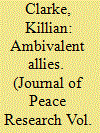

|
|
|
|
|
| Summary/Abstract |
Since the Cold War ended, foreign support has been identified as an important factor in facilitating democratization. However, in certain parts of the world Western enthusiasm for democratization has been highly uneven, particularly when regime change has been achieved through nonviolent revolutionary mobilization. This article introduces the concept of ‘ambivalent allies’ and argues that ambivalence may be highly detrimental to new democracies emerging from nonviolent resistance. Ambivalent allies signal public support for a democratic transition while remaining quietly skeptical about the desirability or viability of the new regime. These misleading signals cause democratic leaders to deprioritize the maintenance of their diverse coalitions, choosing instead an exclusivist approach that alienates their domestic partners. They therefore end up doubly exposed to counterrevolutionary threats, lacking both a broad domestic support base and strong foreign backers. The article illustrates this argument through an examination of Egypt’s 2011 revolution and 2013 coup, drawing on approximately 100 interviews with Egyptian political leaders and foreign diplomats. It shows that the USA’s ambivalence toward the transition contributed to the coup by giving the elected government headed by Mohamed Morsi a false impression that it had strong foreign backing, and that it could afford to marginalize the secularist wing of the original revolutionary coalition. Egypt’s experience is then compared to two cases in which new governments survived counterrevolutionary threats: Burkina Faso in 2014 and Madagascar in 2009. The study contributes to our understanding of how international support may facilitate or undermine democratic consolidation following nonviolent revolutions.
|
|
|
|
|
|
|
|
|
|
|
|
|
|
|
|
| 3 |
ID:
130935
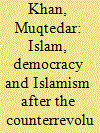

|
|
|
|
|
| Publication |
2014.
|
| Summary/Abstract |
The overthrow of the Muslim Brotherhood's presidency in Egypt by an unprecedented partnership between the army and Tamarod ("rebellion" in Arabic), a grassroots opposition movement, followed by the brutal repression of the Brotherhood, has left observers dazed and puzzled. The speed and savageness with which democracy, and perhaps even the hope for democracy, has been smashed in Egypt was unexpected and harrowing to watch. This episode may cast a long shadow on how Egyptian and regional polities negotiate with endemic authoritarianism.1 It will also have a profound impact on how political Islam, especially in the Arab world, evolves. Some commentators are forecasting the end of political Islam;2 others have limited their obituaries to the Muslim Brotherhood in Egypt.3 Some opine that perhaps the Muslim world is not ready for democracy; others claim the contention that Islam and democracy are not compatible has been vindicated
|
|
|
|
|
|
|
|
|
|
|
|
|
|
|
|
| 4 |
ID:
174710
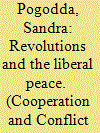

|
|
|
|
|
| Summary/Abstract |
This article explores the relationship between contemporary revolutionary agency, domestic reforms and liberal peacebuilding in the aftermath of the Arab Uprisings. In particular, it focuses on the tensions between the liberal peace’s orthodox and emancipatory strands by asking: Does liberal peacebuilding support or hinder revolutionary emancipation in the Arab region? The article aims to close a gap in PCS scholarship by delivering insights into contemporary revolutionary processes (here called ‘everyday state formation’). After elaborating the disjunctures between revolutionary agency and liberal peacebuilding interventions in the spheres of statebuilding, development and democratisation, many peacebuilding interventions appear as counterrevolutionary practices.
|
|
|
|
|
|
|
|
|
|
|
|
|
|
|
|
| 5 |
ID:
027845
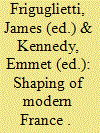

|
|
|
|
|
| Publication |
London, Macmillan Co., 1969.
|
| Description |
xiii, 633p.Hbk
|
|
|
|
|
|
|
|
|
|
|
|
Copies: C:1/I:0,R:0,Q:0
Circulation
| Accession# | Call# | Current Location | Status | Policy | Location |
| 002293 | 944.034/SHA 002293 | Main | On Shelf | General | |
|
|
|
|